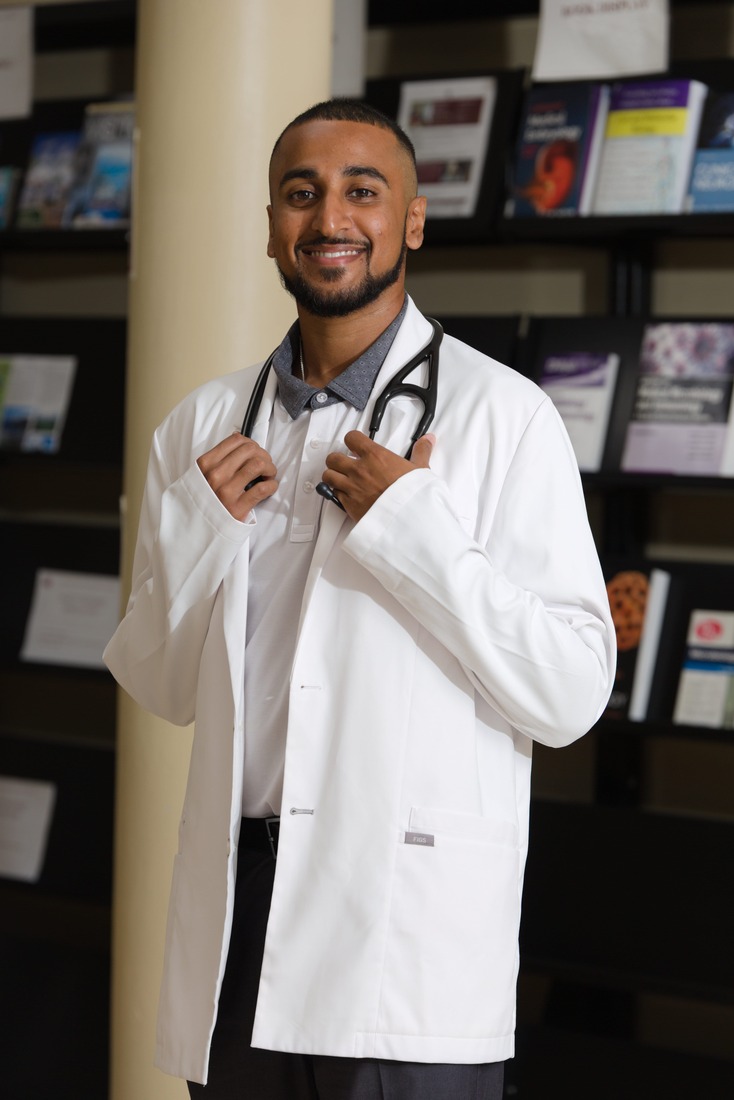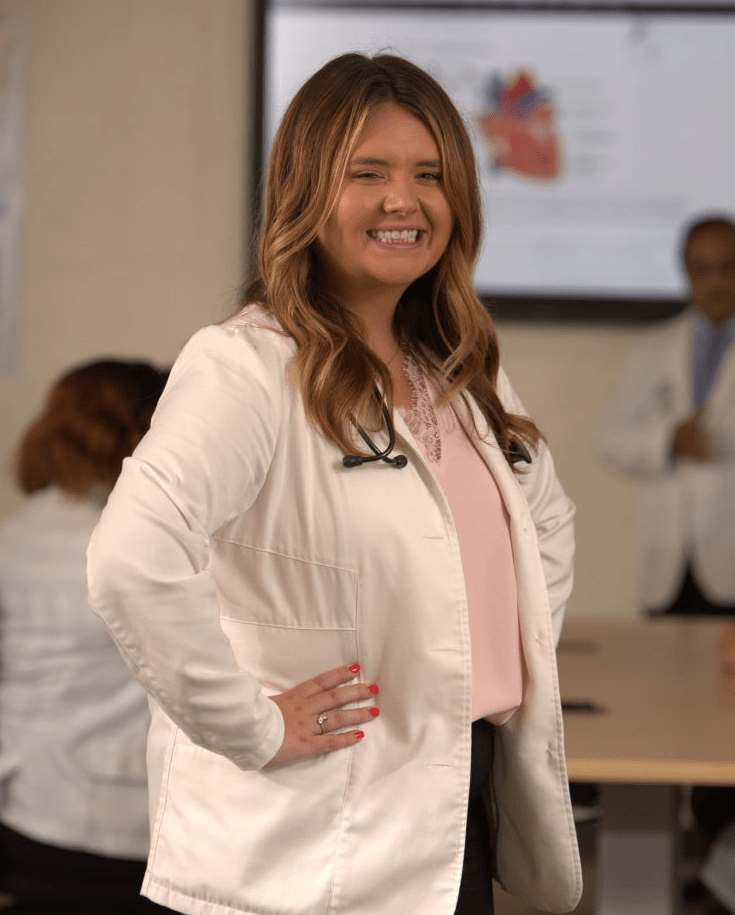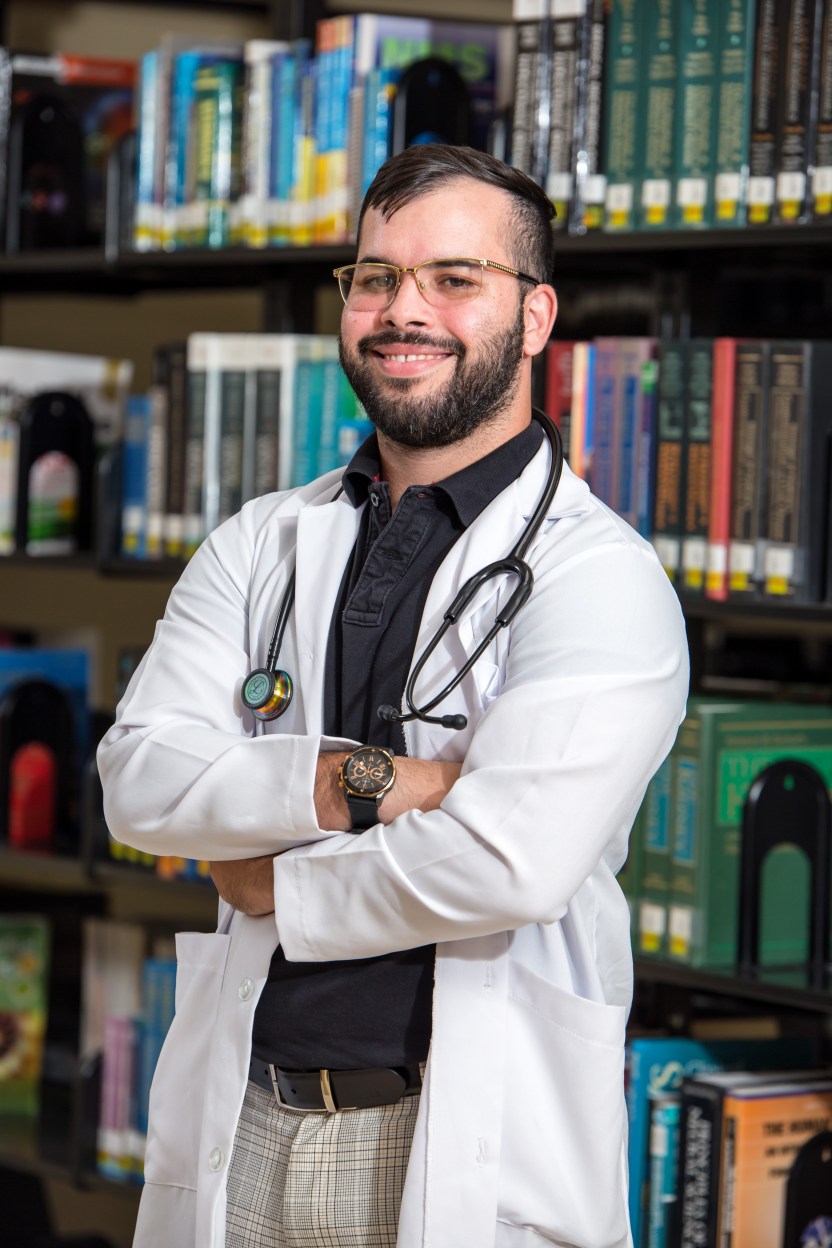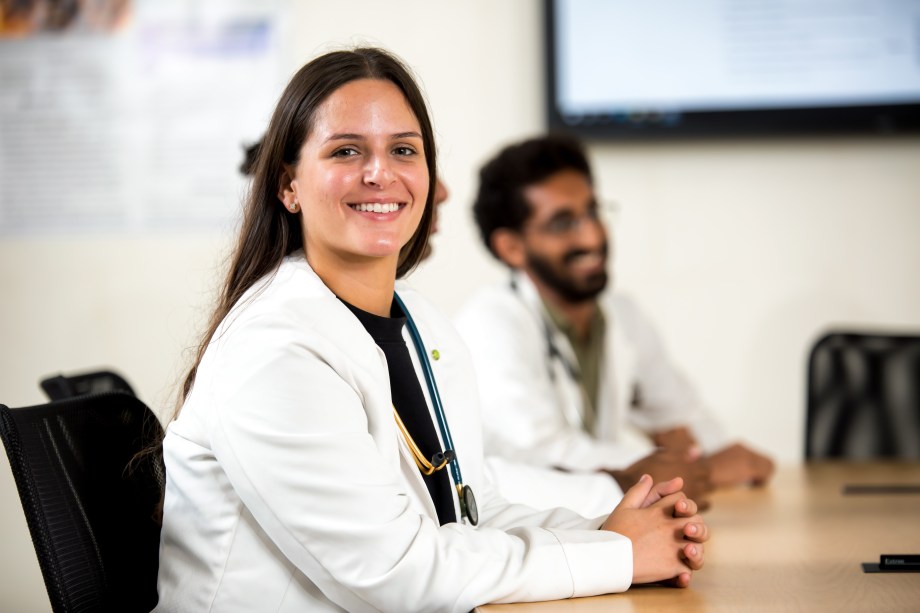
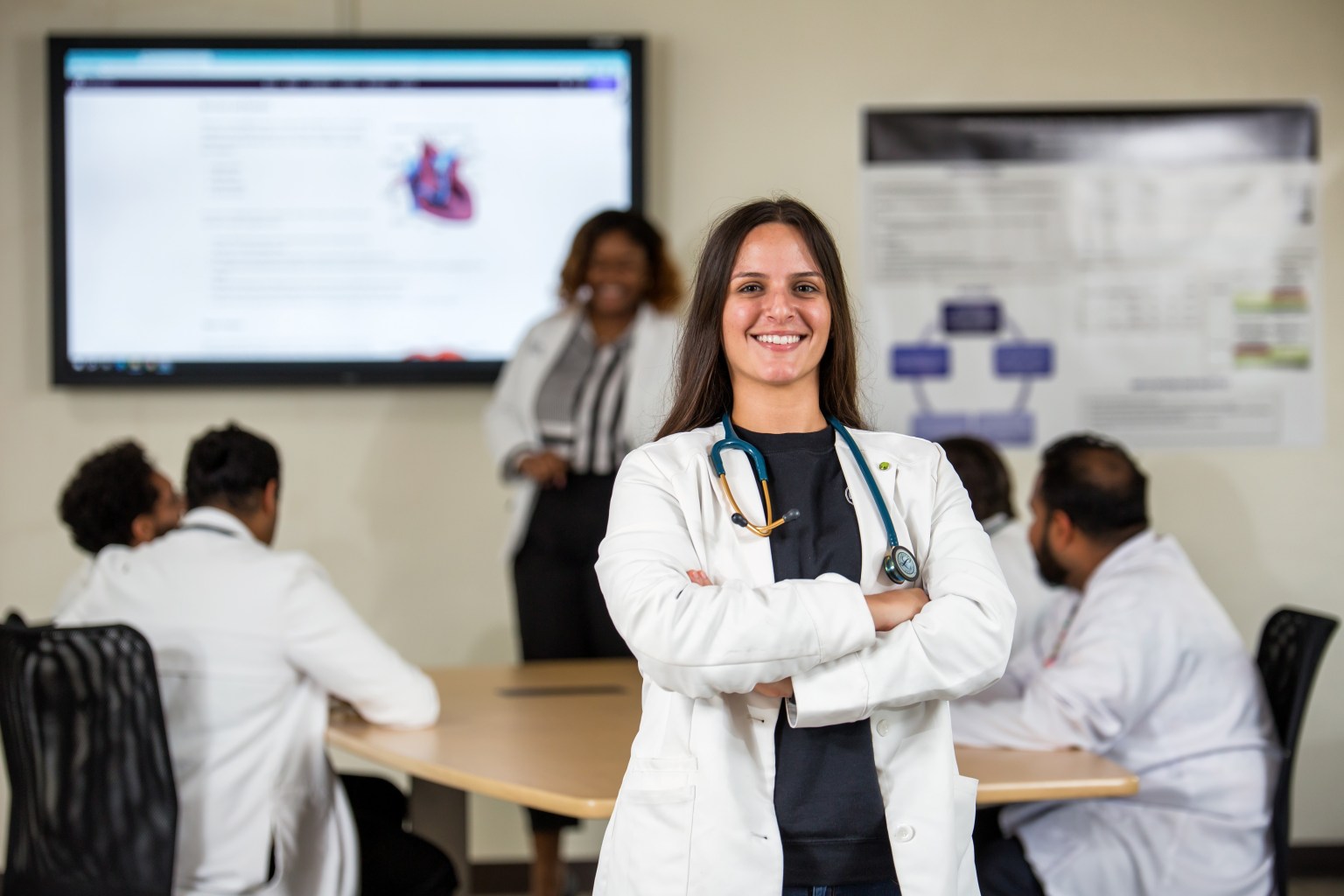
Why MUA?
Discover more about our medical school in the Caribbean including class sizes, clinical rotations, and accreditations.

See why students choose MUA for their MD program:
Top Residency Placement Rates
MUA takes pride in our 94% three-year residency placement rate.*
*94% Three-Year Residency Placement Rate is the percent of students attaining a residency position out of all graduates or expected graduates in 2022-2023, 2023-2024 and 2024-2025 who were active applicants in the NRMP match or attained a residency outside the NRMP match.
Most Affordable of the Top Schools
Save more as you pursue your MD. MUA is the most affordable of the top Caribbean medical schools approved to participate in U.S. Federal Financial Aid Programs. Additionally, Canadian citizens can pay tuition and fees in Canadian dollars, resulting in significant cost savings.

1. USD totals listed on each institution’s website in June 2025, converted to CAD at existing exchange rate ($1 USD to $1.37 CAD).
2. Canadian citizens pay MD program tuition and admin. fee totals in CAD (no conversion necessary).
3. Average U.S. MD program cost: educationdata.org/average-cost-of-medical-school
Integrated, Systems-Based Curriculum
MUA’s academic program is based on the integrated, systems-based approach in use at top U.S. medical schools. Diverse learning opportunities include interactive lectures, small-group work sessions, individual and group presentations, team-based learning, and simulations with standardized patients.
In addition, our MD program offers learning experiences you won’t find at big international schools. For example, MUA’s first-semester anatomy class includes the dissection of cadavers, as at many U.S. medical schools, giving you early hands-on training you won’t get at the bigger schools.
Also, MUA offers a unique research module that teaches you critical analytical skills you’ll need throughout your medical career to evaluate and assimilate scientific evidence and continually expand your knowledge.
Class Size and Learning Environment
At MUA, we teach an integrated, systems-based curriculum similar to what you’ll find at leading U.S. medical schools. What truly differentiates MUA is how we teach it.
At the core of MUA’s educational philosophy is the belief that small class sizes, with significant student-teacher interaction, are fundamental to the student experience.
This means that MUA students get one-to-one attention in the basic sciences and the ongoing support they need during their clinical rotations. This is a critical benefit that larger medical schools simply cannot offer.
MUA has a 3:1 student-to-faculty in the Gateway program and a 5:1 student-to-faculty ratio in the Basic Science program, allowing one-to-one interaction with our professors.
We begin, of course, with a highly experienced and accomplished faculty. All MUA faculty members are seasoned educators and hold an advanced medical degree (MD, MBBS) or doctoral degree in the field they teach.
But we also look for something special when we hire faculty: a demonstrated willingness to welcome and encourage student interaction. In fact, one of the main reasons faculty members tell us they chose MUA over other schools is the opportunity we give them to work closely with their students.
It’s a core belief at MUA that students learn best in small classes, where they have the opportunity to work one-on-one with their professors. You won’t find the anonymous, big lecture hall experience at MUA that’s increasingly becoming the norm at other schools.
Small classes allow for individualized attention throughout the semester, from the important early days when critical concepts are being established to exam time when getting just a few more minutes of insight and explanation from an experienced teacher can make all the difference.
You’ll feel that faculty support not only in the classroom but outside the learning environment as well. MUA faculty members maintain a flexible open-door policy and make themselves available to students whenever needed.
Let’s face it: Medical school is challenging enough. Struggling to get sufficient time with your teachers is an extra challenge you don’t need.
Moreover, MUA’s faculty support doesn’t end when you move on to clinical rotations in the U.S. and Canada. MUA provides significantly more oversight and guidance during clinicals than other schools. (You can learn more about that on our Clinical Difference page).
Finally, MUA’s insistence on small classes and supportive faculty has benefits that extend beyond the classroom. It creates a true feeling of community at MUA, a sense that faculty members and fellow students are all working together toward the common goal of helping you become a doctor.
It’s a feeling that’s hard to quantify, but it’s there. Some call it, simply, “the MUA Magic.” Whatever it is, you will feel it from the moment you arrive on campus to the moment you and your classmates graduate as doctors — together.

Our Faculty
All MUA faculty members have an advanced medical or doctoral degree (MD, MBBS, PhD) in their academic field, with postgraduate training in their specialty, as well as demonstrated experience in teaching and research.
They are available on-campus and on the island throughout your studies and are passionate and care deeply about your future success within the medical industry. The small class sizes allow for more personal and quality teaching from staff to students, providing the support needed to nourish our student’s full potential.
The Campus and Caribbean
Located on the beautiful island of Nevis, MUA’s 10-acre campus boasts modern classrooms (including a dedicated on-campus test center), fully equipped laboratories, an extensive library, and an island hospital where students can get clinical experience early in their basic science study. Outside the classroom, students enjoy well-appointed student residencies and gym facilities, plus all the amenities of Nevis island life, including a weekly fresh produce market and the stunning beaches Nevis is famous for.
And then there is the amazing adventure of spending two years of your life on the beautiful and historic island of Nevis — an opportunity to immerse yourself in a new culture and a different way of life that you may never have again.
So yes, you will study hard when you come to MUA. But you will leave not only with an incomparable medical education but with good friends and a lifetime of memories.
Student Experience of Life on Nevis

Residency Placements
MUA students obtain residencies in competitive programs across the full range of medical specialties in the U.S. and Canada. Many of MUA’s graduates excel in their residencies, becoming Chief Residents, and many pursue Fellowship opportunities following residency.
The extensive experience progressively gained through each clinical rotation, both cores and electives, combined with MUA’s oversight, prepares each student for board exams, USMLE Step 2 CK, and ultimately successful placement into residency and success as a resident and a physician.
Most importantly, MUA provides students with a comprehensive “Road to Residency” plan, which clearly identifies all steps required to gain a desirable residency position. MUA’s clinical faculty works individually with students to prepare them for each step of the process, helping them train for the Step II exams, identify potential residency opportunities, and even conduct mock residency interviews.
Our goal is to do everything possible to make sure MUA students get the training, development, and support they need to get the residency they want and ultimately succeed as a practicing clinician.
Clinical Rotations
MUA, like other international medical schools, offers a full complement of tools to help students organize patient notes, perform self-assessments, and manage other elements of their clinical rotations. What sets MUA’s clinical program apart, however, is the personalized, hands-on support provided by MUA’s faculty at every stage of a student’s clinical rotations.
At every step of your clinical rotations, MUA faculty will be in contact with your attending physicians and preceptors to monitor your progress. They’ll personally review your logs and casework and provide regular assessments to make sure you’re progressing as expected.
MUA’s small class size, combined with our emphasis on personalized learning, means you’ll receive a level of support and guidance during your clinical rotations that simply can’t be matched by bigger schools—particularly those with classes three and four times as big as MUA’s.
And if you’re not, the school’s Deans and clinical faculty will work with you to help ensure your success.
Clinical, Professional, and Personal
MUA’s objective is not only to make sure each student maximizes his or her clinical experience but also to focus on career planning and personal growth. Additionally, MUA works with students on the mundane yet vital administrative details that come with clinical rotations, such as housing and scheduling.
The result is that MUA students are able to focus fully on their clinical, professional, and personal development during this critical phase of their education, knowing the MUA team is behind them.
That’s a far cry from the experience at other schools, where students are often on their own once they move on from Basic Science.
Hand-Picked Programs – Personalized Attention
MUA’s extensive clinical network and curricular design ensure that all students have a robust clinical experience focused on preparing them to practice medicine.
The school’s clinical sites provide students the opportunity to become immersed in the finer points of clinical medicine, and they receive significant hands-on training under the guidance and supervision of the clinical faculty and deans.
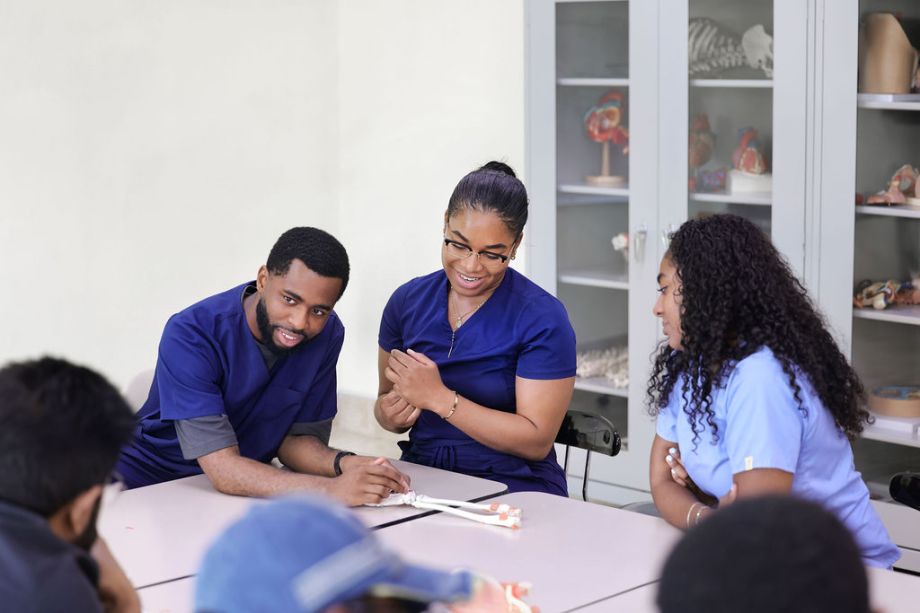
Key U.S. Approvals
MUA is one of only a handful of international medical schools with approvals from the key states of New York, California, and Florida. This means that MUA students have access to high-quality clinical rotations in their 3rd and 4th years of medical school that would otherwise be unavailable to them, as well as access to sought-after residencies and licensure in the case of New York and California, respectively. Collectively, these approvals also make MUA graduates who complete the requisite licensing exams eligible to practice in all 50 U.S. states and Canada.
Accreditations and Approval
Medical University of the Americas is a fully accredited medical school.
The Medical University of the Americas 4-year MD program is accredited by the Accreditation Commission on Colleges of Medicine (ACCM). The MD program and pre-med programs are accredited by the accreditation body of St. Kitts and Nevis.
The United States Department of Education, via the National Committee on Foreign Medical Education and Accreditation (NCFMEA), reviews the standards countries use to accredit medical schools. The NCFMEA has determined that the accreditation standards used by the ACCM to accredit MUA’s medical program are comparable to those used by the Liaison Committee on Medical Education (LCME), the accrediting body that accredits M.D.-granting medical programs in the United States.
Medical University of the Americas is one of the select international medical schools approved to participate in U.S. Federal Student Aid programs. U.S. federal loans are generally preferred over private student loans due to lower fixed interest rates, various forgiveness and repayment options, and the availability of loans that are not tied to the student’s credit worthiness and do not require co-signers.
Medical University of the Americas is one of the few international medical schools with approvals in the key states of New York, California, and Florida. These states mandate institutional review and approval prior to granting access to clerkship opportunities in their respective states. Medical University of the Americas’ students who successfully complete the requisite licensing examinations are eligible to practice medicine in Canada, Puerto Rico, and all 50 U.S. states.
Specifically, the following bodies have approved, recognized, or licensed Medical University of the Americas:
- Approved by the New York State Education Department: In addition to clerkship opportunities, New York approval provides access to residencies in the state.
- Recognized by the Medical Board of California: Recognition is also necessary for licensure. Additionally, other states follow California’s recognition for the purposes of licensure.
- Licensed by the Commission for Independent Education, Florida Department of Education: Additional information regarding this institution may be obtained by contacting:
Florida Department of Education
Commission for Independent Education
325 West Gaines Street
Tallahassee, FL 32399-0400
(888) 224-6684 (toll-free)
www.fldoe.org/cie
Welcoming Canadian Students
Canadians make up a large proportion of each incoming MUA class, and while they’re attracted to MUA for all the same reasons that draw non-Canadian students, these reasons stand out:
Canadians Pay in Canadian Dollars
Canadian students can now pay tuition and fees in Canadian currency (CAD). In addition, MUA is offering a tuition reduction for our Doctor of Medicine program, with Canadian dollars at par with US dollars. Please visit our tuition and fees page for more details.
Residency Placements in Canada
MUA has an incredibly strong track record of securing clinical rotations and residency placements in Canada.
USMLE Preparation
MUA provides extensive preparation for USMLE Step 1, which applies very well to the Medical Council of Canada Qualifying Examination (MCCQE).
More about MUA
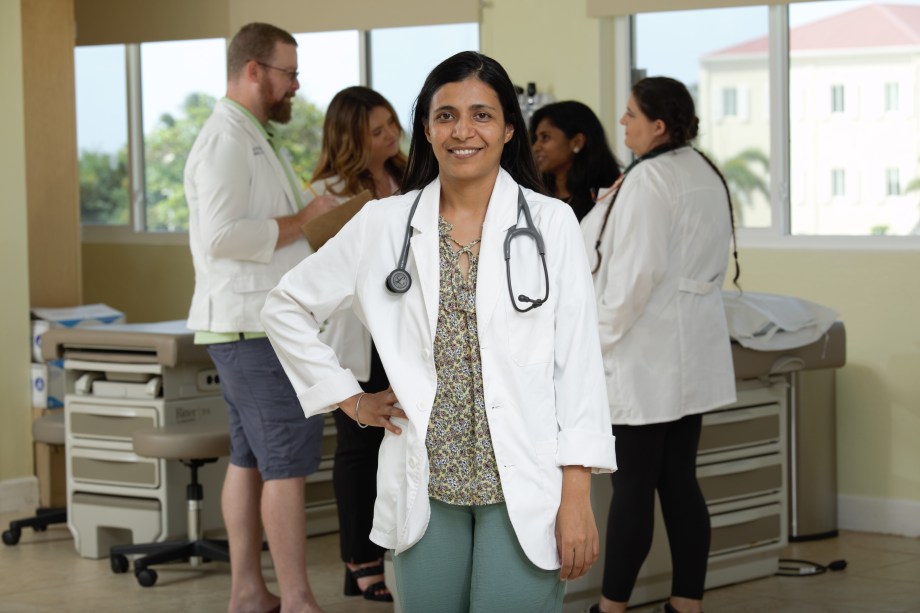
Admissions
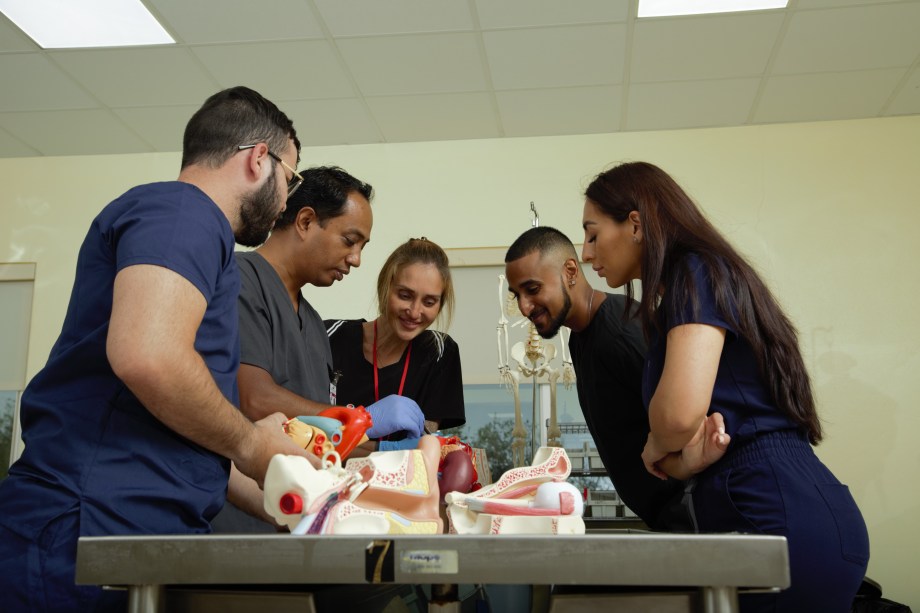
Clinical Difference
“My surgical clinical rotation was excellent. It gave me the ability to assist on operations, not simply view them from the corner of the room.”
—Adnan Qureshi, MD
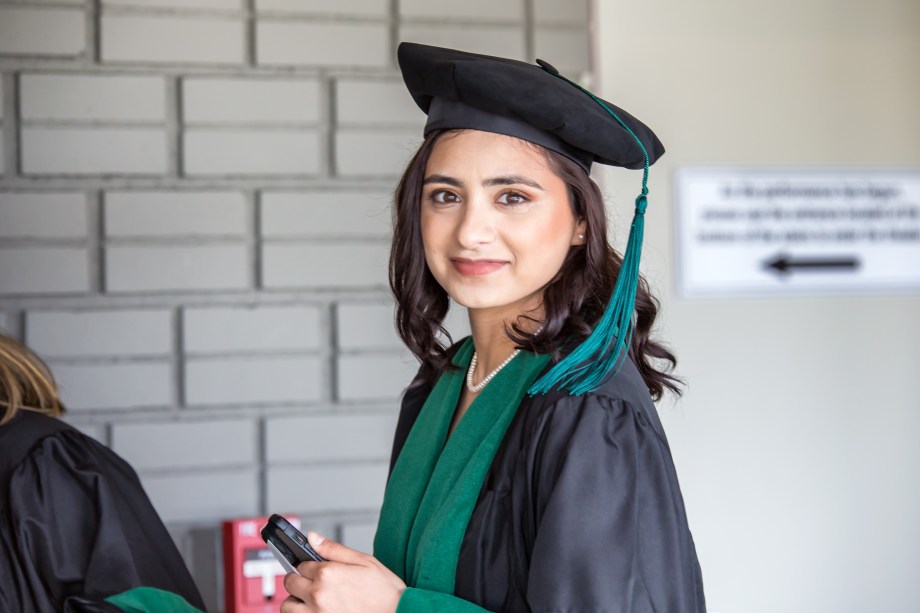
Graduate Success
Inquire Now
